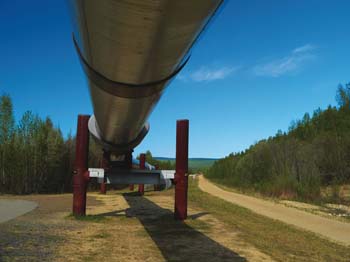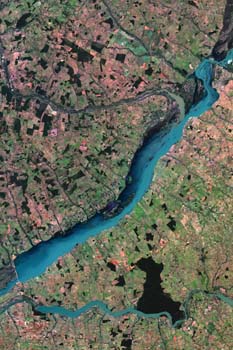| |
Decision-Support Resources Development & Related Research on Human Contributions and Responses
Overview
Recent Accomplishments
Near-Term Plans
Archived News
Postings [June 2000 - July 2005]
Related
Sites
Calls
for Proposals
CCSP / USGCRP Human Contributions and Responses Working Group Members
|
 |
|
 Decisionmakers and other interested citizens need reliable science-based information to make informed judgments regarding policy and actions to address the risks and opportunities of variability and change in climate and related systems. A wide variety of CCSP decision-support resources and related research on human contributions and responses is targeted at that objective. The outcomes of these activities are intended to inform public discussion of climate-related issues and scientifically assess and expand options for mitigation of and adaptation to climate variability and change. The most prominent of CCSP's ongoing decision-support activities is its synthesis and assessment process that involves preparation of 21 different products intended to support public discussion of climate science issues of particular importance to U.S. decisions. CCSP's research on human contributions and responses to global environmental variability and change includes analyses of human drivers of change and their potential impact, societal resilience and ways of reducing vulnerability, approaches for improving the ability of decisionmakers to utilize scientific information, and the effects of global environmental change on infrastructure and human health. CCSP's research is paying particular attention to aspects of global change that have greatest relevance to society, including drought and extreme or abrupt climate events. Decisionmakers and other interested citizens need reliable science-based information to make informed judgments regarding policy and actions to address the risks and opportunities of variability and change in climate and related systems. A wide variety of CCSP decision-support resources and related research on human contributions and responses is targeted at that objective. The outcomes of these activities are intended to inform public discussion of climate-related issues and scientifically assess and expand options for mitigation of and adaptation to climate variability and change. The most prominent of CCSP's ongoing decision-support activities is its synthesis and assessment process that involves preparation of 21 different products intended to support public discussion of climate science issues of particular importance to U.S. decisions. CCSP's research on human contributions and responses to global environmental variability and change includes analyses of human drivers of change and their potential impact, societal resilience and ways of reducing vulnerability, approaches for improving the ability of decisionmakers to utilize scientific information, and the effects of global environmental change on infrastructure and human health. CCSP's research is paying particular attention to aspects of global change that have greatest relevance to society, including drought and extreme or abrupt climate events. |
Human Contributions and Responses to Environmental Change Strategic Research Questions
9.1 What are the magnitudes, interrelationships, and significance of the primary human drivers of, and their potential impact on, global environmental change?
9.2 What are the current and potential future impacts of global environmental variability and change on human welfare, what factors influence the capacity of human societies to respond to change, and how can resilience be increased and vulnerability reduced?
9.3 How can the methods and capabilities for societal decisionmaking under conditions of complexity and uncertainty about global environmental
variability and change be enhanced?
9.4 What are the potential human health effects of global environmental change, and what climate, socioeconomic, and environmental information is needed to assess the cumulative risk to health from these effects?
The Role of Decision-Support Resources Development
Goal 1: Prepare scientific syntheses and
assessments to support informed discussion of climate
variability and change and associated issues by decisionmakers, stakeholders, the media, and the general public.
Goal 2: Develop resources to support adaptive management and planning for responding to climate variability and climate change, and transition these resources from research to operational application.
Goal 3: Develop and evaluate methods
(scenario evaluations, integrated analyses, and alternative
analytical approaches) to support climate change policymaking and demonstrate these methods with case studies.
See Chapter 11 of the Strategic Plan for the U.S. Climate Change Science Program for detailed discussion of decision-support resources development and Chapter 9 for these specific research questions. |
Human activities play an important role in the Earth system and are significant drivers of change in
the environment at all scales—local, regional, national and global. Humans also have the
capability to respond to changes in their environment, and adaptations, when effective, enhance the
resilience of both managed and natural systems. At the same time, social and economic systems are
changing in a world that is more interconnected than ever. A better integrated understanding of the
complex interactions between human societies and the Earth system is needed to identify vulnerable
systems and pursue options that take advantage of opportunities to enhance resilience. The National
Research Council (NRC) report, Climate Change Science: An Analysis of Some Key Questions concluded
that: “In order to address the consequences of climate change and better serve the Nation’s
decisionmakers, the research enterprise dealing with environmental change and environment-society
interactions must be enhanced.” Such an enterprise should include “…support of
interdisciplinary research that couples physical, chemical, biological, and human systems.”

The study of the human interface with change in the global environment is especially important because
of its capacity to inform public policy. Decisionmaking, however, is challenged by uncertainties,
including risks of irreversible and/or nonlinear changes that may be met with insufficient or excessive
responses whose consequences may cascade across generations. The difficulties associated with
uncertainty have become increasingly salient given the interest of policymakers in addressing global
environmental change. Uncertainties arise from a number of factors, including problems with data,
problems with models, lack of knowledge of important underlying relationships, imprecise representation
of uncertainty, statistical variation and measurement error, and subjective judgment.
It is well established that human health is linked to environmental conditions, and that changes in the
natural environment may have subtle, or dramatic, effects on health. Timely knowledge of these effects
may support public health systems in devising and implementing strategies to compensate or respond to
them. Federally supported research has thus far provided information on a broad range of health effects
of global change, including the adverse effects of ozone, atmospheric particles and aeroallergens,
ultraviolet (UV) radiation, vector- and water-borne diseases, and heat-related illnesses and mortality.
|
|